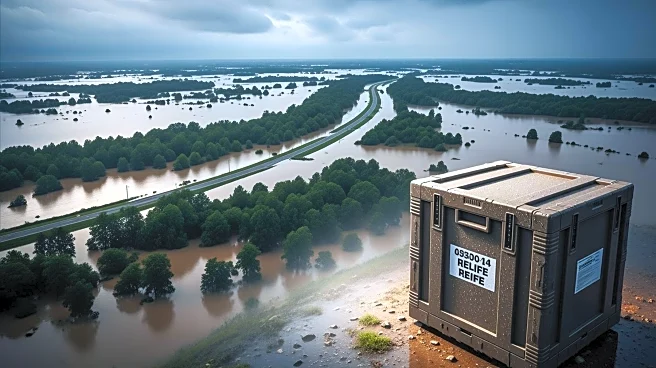What's Happening?
The Las Vegas Convention and Visitors Authority (LVCVA) has attributed a decline in tourism to tariffs imposed by President Trump. According to LVCVA President Steve Hill, decisions made by the administration regarding international relations have led to a decrease in visitors, particularly from Canada, which is the largest international source of tourists for Las Vegas. The city has seen a significant drop in tourism, with only 3.1 million visitors in June, marking an 11.3% decrease compared to the previous year. The hotel industry is also experiencing challenges, with occupancy rates and average daily room rates both declining. Despite these claims, some argue that the issues facing Las Vegas are self-inflicted, citing high prices and additional fees as deterrents for potential visitors.
Why It's Important?
The decline in tourism in Las Vegas has broader implications for the city's economy, which heavily relies on the hospitality and entertainment industries. A decrease in visitors can lead to reduced revenue for hotels, casinos, and other businesses, potentially resulting in layoffs and economic downturns. The tariffs blamed for this decline may also affect other industries reliant on international visitors, highlighting the interconnectedness of global trade policies and local economies. Additionally, the situation in Las Vegas may serve as a case study for other tourist-dependent cities facing similar challenges.
What's Next?
Las Vegas may need to reassess its pricing strategies and overall value proposition to attract more visitors. The city could explore alternative marketing strategies or partnerships to boost tourism. Additionally, ongoing discussions about tariffs and international relations may influence future visitor numbers, depending on how these policies evolve. Stakeholders in the tourism industry may advocate for policy changes or seek to diversify their offerings to mitigate the impact of reduced international visitation.
Beyond the Headlines
The situation in Las Vegas raises questions about the sustainability of its current business model, which has increasingly relied on high prices and fees. There may be ethical considerations regarding the fairness of these charges and their impact on consumer satisfaction. Furthermore, the rise of online gambling and changing consumer preferences could signal a shift in how people engage with entertainment and leisure activities, potentially affecting traditional tourism hubs like Las Vegas.








